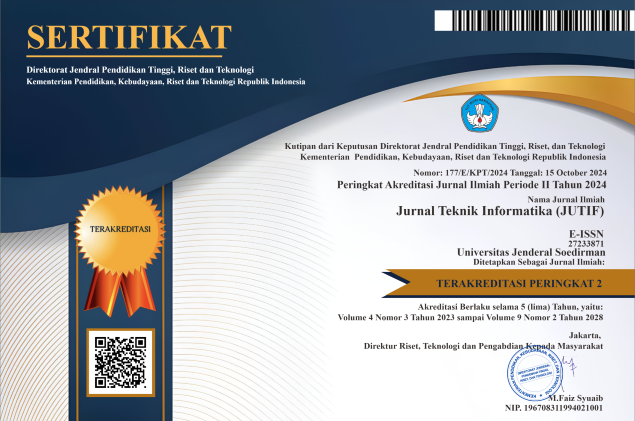DIGITAL DATA SECURITY WITH APPLICATION OF CRYPTOGRAPHY AND DATA COMPRESSION TECHNIQUES
DOI:
https://doi.org/10.52436/1.jutif.2023.4.5.659Keywords:
data compression, digital data security, encryption, cryptographyAbstract
The need for digital data security is to ensure that the data and information we have are confidential and can only be accessed by authorized users. And no one can change the information in it, thus ensuring complete accuracy. The functions of data security are confidentiality, authentication, integrity, and anti-repudiation. Compression techniques are used to protect digital data because they aim to make less storage space and allow us to transfer more data over the internet. This study aims to plan to prove the application of a combination of 2 (two) techniques, namely compression and cryptography to digital data with the aim of increasing the security of the data. This research has the result that the compression technique of the Huffman method is the most effective in compressing digital data into the smallest file size compared to other compression methods. It can compressed the data size by around 30% (thirty percent) to 40% (forty percent) compared to the original data size. And coupled with data security with cryptographic encryption techniques so that files remain safe when transferred over the network.
Downloads
References
A. Supriyanto, “Analisis Kelemahan Keamanan pada Jaringan Wireless,” Anal. Keamanan Jar. Wirel., vol. XI, no. 1, pp. 38–46, 2006.
E. Prayoga and K. M. Suryaningrum, “Implementasi Algoritma Huffman Dan Run Length Encoding Pada Aplikasi Kompresi Berbasis Web,” J. Ilm. Teknol. Infomasi Terap., vol. 4, no. 2, pp. 92–101, 2018.
S. Wardoyo and R. Fahrizal, “Aplikasi Teknik Enkripsi Dan Dekripsi File Dengan Algoritma Blowfish Pada Perangkat Mobile Berbasis Android,” Setrum Sist. Kendali-Tenaga-elektronika-telekomunikasi-komputer, vol. 3, no. 1, p. 43, 2016.
H. Situmorang, “Keamanan Basis Data dengan Teknik Enkripsi,” Mahajana Inf., vol. 1, no. 1, pp. 22–27, 2016.
W. C. Easttom, Computer Security Fundamentals. 2011.
A. Savoldi and P. Gubian, “Data hiding in SIM/USIM cards: A steganographic approach,” in Proceedings - SADFE 2007: Second International Workshop on Systematic Approaches to Digital Forensic Engineering, 2007, pp. 86–97.
B. Mondal, N. Biswas, and T. Mandal, “A Comparative study on Cryptographic Image Scrambling,” Proc. Second Int. Conf. Res. Intell. Comput. Eng., vol. 10, pp. 261–268, 2017.
N. Aminudin et al., “Nur algorithm on data encryption and decryption,” Int. J. Eng. Technol., vol. 7, no. 2.26 Special Issue 26, pp. 109–118, 2018.
A. K. Harsa, “Keamanan Data Dengan Menggunakan Algoritma Rivest Code 4 (Rc4) Dan Steganografi Pada Citra Digital,” Inform. Mulawarman Februari, vol. 9, no. 1, 2014.
B. E. Widodo and A. S. Purnomo, “Implementasi Advanced Encryption Standard Pada Enkripsi Dan Dekripsi Dokumen Rahasia Ditintelkam Polda Diy,” J. Tek. Inform., vol. 1, no. 2, pp. 69–77, 2020.
M. A. A. Pujari and M. S. S. Shinde, “Data Security using Cryptography and Steganography,” IOSR J. Comput. Eng., vol. 18, no. 04, pp. 130–139, 2016.
S. K. Rao, D. Mahto, and D. A. Khan, “A Survey on Advanced Encryption Standard,” Int. J. Sci. Res., vol. 6, no. 1, pp. 711–724, 2017.
C. Raghavendra, S. Sivasubramanian, and A. Kumaravel, “Improved image compression using effective lossless compression technique,” Cluster Comput., vol. 22, pp. 3911–3916, 2019.
A. R. Trilaksono, “Efektivitas Penggunaan Google Drive Sebagai Media Penyimpanan Di Kalangan Mahasiswa,” J. Digit. Teknol. Inf., vol. 1, no. 2, p. 91, 2020.
M. Jayedul and M. Nurul, “Study on Data Compression Technique,” Int. J. Comput. Appl., vol. 159, no. 5, pp. 6–13, 2017.
H. N. Saad, F. mushtaq Jafar, and H. A. Salman, “A new compression technique in MANET: Compressed-LZW algorithm,” Indones. J. Electr. Eng. Comput. Sci., vol. 16, no. 2, pp. 890–896, 2019.



























